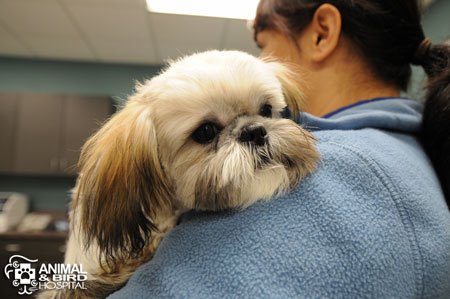Vaccine now available for the new H3N2 strain of Canine Influenza Virus that has caused outbreaks in 25 states

Canine influenza, or dog flu, is a highly contagious respiratory infection of dogs that is caused by two strains of an influenza A virus. The first strain reported in the United States, beginning in 2004, is an H3N8 influenza A virus. Along with many animal hospitals around the country, we have been vaccinating at risk dogs for this strain of flu for over five years.
However, in March 2015, an outbreak that started in Chicago was found to be caused by a separate Canine Influenza Virus (CIV), H3N2, which had never been seen in the US, has been spreading across the country and has now caused illness in dogs in 25 states
Since both strains of Canine Influenza Virus, H3N2 and H3N8, cause illness and, in severe cases, can be fatal, our hospitals have adopted American Veterinary Medical Association recommendations and now recommend vaccination for both strains for at-risk dogs.
What are the symptoms of Canine Influenza?
As with flu in humans, symptoms and severity may vary from dog to dog. Symptoms of Canine Influenza H3N2 are similar to those of CIV H3N8. They may include reduced appetite, high fever, cough, runny nose, and lethargy. Symptoms can persist for several weeks. Dogs with CIV H3N2 may show more severe signs than dogs with CIV H3N8 and in less than 10% of cases can be fatal.
Which dogs should be vaccinated for Canine Influenza Virus?
The veterinarians in our hospitals believe strongly that preventative care recommendations for pets should be individualized based on numerous factors including the lifestyle of individual pets.
Not all dogs have a substantial risk of being infected with dog flu, but those with certain lifestyles should be vaccinated for both strains of Canine Influenza Virus.
We recommend Canine Influenza Vaccination for dogs in the following lifestyle situations:
- Puppy classes
- Doggie day care
- Boarding
- Grooming
- Dog shows
- Dog sports events
- Dog park visits
Do dogs that have been vaccinated for the first Canine Influenza H3N8 Virus need to be vaccinated for the Canine Influenza H3N2 Virus that has been causing recent outbreaks?
Unfortunately, because there is no evidence of cross-protection being provided by one Canine Influenza Vaccination for the other influenza virus, dogs at risk for infection should be vaccinated for both virus strains.
How is the new Canine Influenza H3N2 Virus vaccine administered?
The administration is identical to the Canine Influenza H3N8 Virus vaccine in that two doses, three weeks apart are necessary in order to provide protection. Annual re-vaccination with a single dose is recommended for dogs that continue to be at risk.
Has Canine Influenza been a problem in the Tampa Bay area?
There has not been an outbreak of either of the Canine Influenza Viruses in the Tampa Bay area. Ironically, this means that dogs in our area are at greater risk if they are exposed to Canine Influenza. This is because dogs in the Tampa Bay area have no community immunity and the only dogs that are protected are those that have been vaccinated. This is the same situation that existed in the areas with the most serious outbreaks (Chicago and Atlanta) of the Canine Influenza H3N2 Virus in 2015 until an infected dog arrived and triggered infections in thousands of dogs. Dogs that are infected with Canine Influenza can transmit the virus for 1-2 weeks and they don’t always show signs of illness during the entire time that they can infect other dogs.
If a dog is going to be exposed to a group of dogs, how long before the exposure should the dog be vaccinated in order to be protected from Canine Influenza?
The full benefit of Canine Influenza Vaccination doesn’t develop until at least a week after the second dose of the vaccine. Since the second dose of the vaccine is typically administered three weeks after the first dose, the first dose should ideally be administered at least four weeks before the exposure to a group of at-risk dogs.
Will vaccination for both Canine Influenza Viruses (H3N8 and H3N2) be required for boarding?
We anticipate that more boarding and doggy daycare facilities in the Tampa Bay area will require vaccination for both Canine Influenza Viruses as awareness of outbreaks in numerous areas in the US increases. Vaccination for Canine Influenza H3N8 Virus has been required for dogs staying in our pet resorts for years. In order to allow time for dogs to receive both doses of Canine Influenza H3N2 Vaccine, our pet resorts will not require this vaccination until March 1, 2016.
- Behavior (12)
- Caring for your pet (266)
- cat (6)
- Community Events (19)
- dog (7)
- From Our Clients (15)
- Happy Tails (9)
- News (424)
- Press (53)
- Products (2)
- Questions (4)
- Recalls (1)
- Special Offers (5)
- Tips & Advice (231)
- Uncategorized (19)
- Veterinary Services (48)
